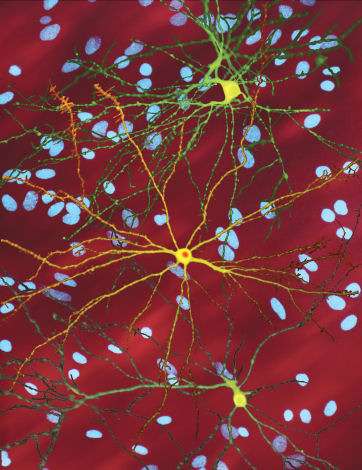Inherited gene that leads to Huntington's causes changes in brain development from a young age

The inherited gene that leads to Huntington's disease has been found to affect brain development from an early age, even though most patients don't develop symptoms of the disease until they are between the ages of 30 and 50.
The findings of the study, by Cardiff University, University of Erlangen-Nuremberg and Lund University, which looked at brain function in mice, could help researchers to develop new treatments in the future that would be given from a young age, to delay the onset of the disease.
Huntington's disease is caused by patients inheriting a faulty gene, which leads to the production of a toxic protein called mutant huntingtin. Mutant huntingtin protein slowly poisons specific groups of brain cells, leading to gradual dysfunction and decline in motor skills, cognitive abilities and behaviour over a twenty year period. The disease ultimately leads to patients needing 24 hour nursing care and is fatal.
Dr Florian Siebzehnrubl, from Cardiff University, said: "There is still no known cure for Huntington's, so it is vital that we gain an understanding of the processes happening in the brain throughout a lifetime, so that we can develop effective treatments.
"Our new research gives us a better understanding of the point at which the mutant gene begins to influence the brain, and this will provide further detail that can allow us to develop potential treatments for this fatal disease that could be given from a younger age before people become symptomatic."
It's thought Huntington's disease affects between one in 10,000 and one in 20,000 people and the disease affects men and women equally. In addition to there being no cure for the disease, there is also currently no way of stopping it from progressing, but treatment and support can help reduce some of the problems it causes.
This study 'Early postnatal behavioral, cellular, and molecular changes in models of Huntington disease are reversible by HDAC inhibition' is published in the Proceedings of the National Academy of Sciences.
More information: Florian A. Siebzehnrübl et al. Early postnatal behavioral, cellular, and molecular changes in models of Huntington disease are reversible by HDAC inhibition, Proceedings of the National Academy of Sciences (2018). DOI: 10.1073/pnas.1807962115



















